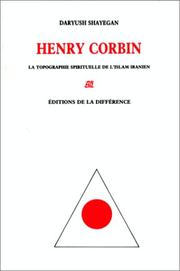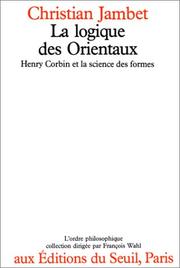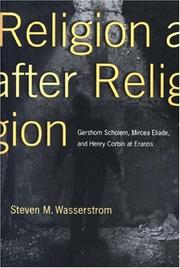| Listing 1 - 9 of 9 |
Sort by
|
Book
ISBN: 9782226215680 2226215689 Year: 2011 Publisher: Paris: Albin Michel,
Abstract | Keywords | Export | Availability | Bookmark
 Loading...
Loading...Choose an application
- Reference Manager
- EndNote
- RefWorks (Direct export to RefWorks)

ISBN: 2729105328 Year: 1990 Publisher: Paris Ed. de la différence
Abstract | Keywords | Export | Availability | Bookmark
 Loading...
Loading...Choose an application
- Reference Manager
- EndNote
- RefWorks (Direct export to RefWorks)
Islam --- Corbin, Henry.
Book
ISBN: 9782908606911 2908606917 Year: 2014 Publisher: Paris : Entrelacs,
Abstract | Keywords | Export | Availability | Bookmark
 Loading...
Loading...Choose an application
- Reference Manager
- EndNote
- RefWorks (Direct export to RefWorks)
Etude sur les écrits d'Henry Corbin (1903-1978), orientaliste spécialiste de la mystique islamique, qui introduit le concept de mundus imaginalis dans la pensée contemporaine. L'auteur, philosophe, donne des pistes pour appréhender l'oeuvre du théologien, ses idées et ses thèmes phares, et fournit des références pour ceux qui désirent approfondir le sujet. ©Electre 2015
Mysticism --- Mysticisme --- Islam --- Corbin, Henry
Book
Year: 1977 Publisher: [Tehran] : The University,
Abstract | Keywords | Export | Availability | Bookmark
 Loading...
Loading...Choose an application
- Reference Manager
- EndNote
- RefWorks (Direct export to RefWorks)
Book
ISBN: 2851970399 9782851970398 Year: 1981 Volume: 39 Publisher: Paris
Abstract | Keywords | Export | Availability | Bookmark
 Loading...
Loading...Choose an application
- Reference Manager
- EndNote
- RefWorks (Direct export to RefWorks)
French literature --- Corbin, H. --- Islam --- Corbin, Henry --- Corbin, Henri --- Corbin, Henry, --- Korben, Anri --- Kurbin, Hānrī --- Kūrbān, Hinrī --- كربين، هنري --- كربن، هانرى --- كربن، هنرى --- كوربان، هنري --- كوربن، هنرى --- کربين، هنرى --- Mohammedanism --- Muhammadanism --- Muslimism --- Mussulmanism --- Religions --- Muslims --- Corbin, Henry. --- Islam. --- Philosophy --- Corbin, Henry., --- CORBIN (HENRY EUGENE) --- PHILOSOPHIE FRANCAISE --- 20E SIECLE

ISBN: 2020064537 9782020064538 Year: 1983 Publisher: Paris
Abstract | Keywords | Export | Availability | Bookmark
 Loading...
Loading...Choose an application
- Reference Manager
- EndNote
- RefWorks (Direct export to RefWorks)
Logic --- Corbin, H. --- Asia --- Form (Logic) --- Forme (Logique) --- Corbin, Henry. --- History --- Corbin, Henry --- 1 <=927> --- -Logical form --- Arabische, islamitische filosofie --- -Corbin, Henry --- Corbin, Henri --- Corbin, Henry, --- Korben, Anri --- Kurbin, Hānrī --- Kūrbān, Hinrī --- كربين، هنري --- كربن، هانرى --- كربن، هنرى --- كوربان، هنري --- كوربن، هنرى --- کربين، هنرى --- 1 <=927> Arabische, islamitische filosofie --- -Arabische, islamitische filosofie --- -Logic --- Logical form --- -1 <=927> Arabische, islamitische filosofie --- Form (Logic) - History - 20th century

ISBN: 0691005397 9780691005393 0691005400 9780691005409 9786612457890 1282457896 140082317X 1400813778 Year: 1999 Publisher: Princeton, NJ : Princeton University Press,
Abstract | Keywords | Export | Availability | Bookmark
 Loading...
Loading...Choose an application
- Reference Manager
- EndNote
- RefWorks (Direct export to RefWorks)
By the end of World War II, religion appeared to be on the decline throughout the United States and Europe. Recent world events had cast doubt on the relevance of religious belief, and modernizing trends made religious rituals look out of place. It was in this atmosphere that the careers of Scholem, Eliade, and Corbin--the twentieth century's legendary scholars in the respective fields of Judaism, History of Religions, and Islam--converged and ultimately revolutionized how people thought about religion. Between 1949 and 1978, all three lectured to Carl Jung's famous Eranos circle in Ascona, Switzerland, where each in his own way came to identify the symbolism of mystical experience as a central element of his monotheistic tradition. In this, the first book ever to compare the paths taken by these thinkers, Steven Wasserstrom explores how they overturned traditional approaches to studying religion by de-emphasizing law, ritual, and social history and by extolling the role of myth and mysticism. The most controversial aspect of their theory of religion, Wasserstrom argues, is that it minimized the binding character of moral law associated with monotheism. The author focuses on the lectures delivered by Scholem, Eliade, and Corbin to the Eranos participants, but also shows how these scholars generated broader interest in their ideas through radio talks, poetry, novels, short stories, autobiographies, and interviews. He analyzes their conception of religion from a broadly integrated, comparative perspective, sets their distinctive thinking into historical and intellectual context, and interprets the striking success of their approaches.
Religion --- Philosophy --- History --- Philosophie --- Histoire --- Scholem, Gershom, --- Eliade, Mircea, --- Corbin, Henry. --- Scholem, Gershom Gerhard, --- 291.1 --- -Religion, Primitive --- Atheism --- God --- Irreligion --- Religions --- Theology --- Godsdienstfilosofie --- -History --- -Scholem, Gershom Gerhard --- Eliade, Mircea --- Corbin, Henry --- Corbin, Henri --- Corbin, Henry, --- Korben, Anri --- Kurbin, Hānrī --- Kūrbān, Hinrī --- كربين، هنري --- كربن، هانرى --- كربن، هنرى --- كوربان، هنري --- كوربن، هنرى --- کربين، هنرى --- -Godsdienstfilosofie --- 291.1 Godsdienstfilosofie --- -291.1 Godsdienstfilosofie --- Religion, Primitive --- Eliade, M. --- Scholem, Gershom --- Religion - Philosophy - History - 20th century. --- Scholem, Gershom Gerhard, - 1897 --- -Eliade, Mircea, - 1907-1986
Book
ISBN: 9781350200180 9781780938240 9781780936949 9781780936543 Year: 2022 Publisher: London Bloomsbury Academic
Abstract | Keywords | Export | Availability | Bookmark
 Loading...
Loading...Choose an application
- Reference Manager
- EndNote
- RefWorks (Direct export to RefWorks)
"Why would a devout Catholic, a committed Protestant, and a Maoist atheist devote their lives and work to the study of esoteric aspects of Islam? How are these aspects 'good to think with'? What are the theoretical and intellectual problems to which they provide solutions? These are the questions at the heart of Esoteric Islam in Modern French Thought. The three French specialists of Islam described above form an intellectual and personal genealogy that structures the core of the text: Massignon taught Corbin, who taught Jambet in his turn. Each of them found in the esoteric a solution to otherwise insurmountable problems: desire for Massignon, certainty for Corbin, and resurrection/immortality for Jambet. Over the course of three long chapters focused on the life and work of each writer, the book maps the central place of esoteric Islam in the intellectual life of twentieth and twenty-first century France"--
Islam --- Islamic civilization --- Civilization, Western --- East and West --- Study and teaching --- Western influences --- Islamic influences --- Massignon, Louis --- Corbin, Henry --- Jambet, Christian
Book
ISBN: 2503519040 9782503519043 Year: 2005 Volume: 1 Publisher: Turnhout Brepols
Abstract | Keywords | Export | Availability | Bookmark
 Loading...
Loading...Choose an application
- Reference Manager
- EndNote
- RefWorks (Direct export to RefWorks)
Henry Corbin, philosophies et sagesses des religions du Livre : actes du Colloque Henry Corbin, Sorbonne, les 6-8 novembre 2003 .Actes du colloque organisé par l'Ecole pratique des hautes études et le Centre d'études des religions du Livre, avant-propos Mohammad Ali Amir-Moezzi. Le présent volume regroupe des communications données lors du colloque tenu en Sorbonne les 6-8 novembre 2003 à l'occasion du centenaire de la naissance de Henry Corbin. Il s'agissait à cette occasion de rendre hommage à ce grand penseur non pas par une suite stérile d'éloges, mais en poursuivant les lignes de réflexions sur la philosophie et les religions qu'il avait si généreusement ouvertes. Une grande partie de l'oeuvre de Corbin a concerné la pensée islamique classique. Tout naturellement, plusieurs intervenants ont donc approfondi ou précisé certaines voies par lui tracées : son approche du chiisme duodécimain (Mohammad Ali Amir-Moezzi), de l'ismaélisme (Daniel de Smet, Guy Monnot), de la mystique persane (Paul Ballanfat, Charles-Henri de Fouchécour), du soufisme d'Ibn `Arabi (Michel Chodkiewicz). Toutefois, la réflexion sur des points de religions non musulmanes, également stimulés par Henry Corbin, a trouvé sa place ici : la christologie ancienne (Simon Mimouni, Gerard Wiegers), la spiritualité du judaïsme (Paul Fenton, Maria Subtelny). Enfin, c'est la pensée philosophique tout court qui s'est trouvée fécondée par les apports de Corbin. C'est ce qu'illustrent les réflexions de Christian Jambet sur l'histoire, de Jean-Michel Hirt sur la psychanalyse, de Hermann Landolt sur l'avicennisme, de Jean-François Marquet sur «la science de l'unique», de James Morris sur la transmission de la science des religions, de Jean-Louis Vieillard-Baron sur l'hegelianisme
Colloques --- Colloquia --- Corbin, Henry --- Godsdienstfilosofie --- Philosophie religieuse --- Islam --- Religion --- Congresses. --- Philosophy --- Congrès --- Philosophie --- 291 --- Godsdienstwetenschap: vergelijkend --- Conferences - Meetings --- Congrès --- Corbin, Henri --- Islam - Congresses. --- Religion - Philosophy - Congresses. --- Henry Corbin --- histoire --- psychanalyse et religion monothéiste --- religion --- the study of religion --- Hegel --- la prière --- le shi'isme imamite --- Ibn 'Arabi --- al-Shahrastani --- les études ismaéliennes --- le soufisme iranien --- la poésie mystique persane --- l'avicennisme --- judaïsme et judéo-christiannisme --- la mystique juive --- la doctrine du Verus Propheta de la littérature pseudo-clémentine --- the Gospel of Barnabas --- les rapports entre la mystique islamique et la mystique juive --- philosophie --- islam
| Listing 1 - 9 of 9 |
Sort by
|

 Search
Search Feedback
Feedback About UniCat
About UniCat  Help
Help News
News